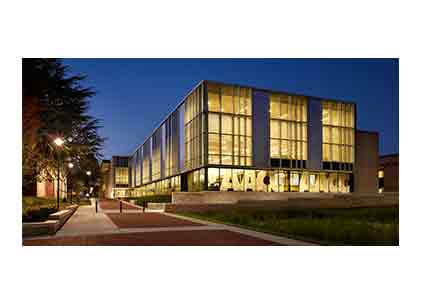What Are The Steps to Becoming an HVAC Engineer?
Please note that the following is only one path to becoming an HVAC engineer, and includes information about how to become licensed in mechanical engineering.
Having a Professional Engineer (PE) credential allows a mechanical engineer to work on publicly funded HVAC projects and may enhance his or her leadership and earning prospects. Rather than pursuing the PE license, other aspiring HVAC engineers may substitute additional years of hands-on experience or pursue other avenues. Here is one possible pathway into this high-growth profession:
Step 1: Obtain a high school diploma or GED (four years).
Aspiring HVAC engineers may excel at math and science in school, and are advised to seek out extracurricular activities in shop class, volunteering (or working) with local HVAC companies, or other opportunities related to the industry. Please note that admissions to four-year, ABET-accredited schools in mechanical engineering can be competitive, and students are encouraged to maintain a strong GPA (e.g., >3.0).
Step 2: Obtain an associate or bachelor’s degree in engineering (two to four years).
At this stage, a prospective HVAC engineer is encouraged to enroll in a two- to four-year program in mechanical engineering, HVAC engineering, or a related discipline.
In both associate and bachelor degree programs, students can expect to take courses such as energy calculations, air flow and balancing, air handling equipment, pumps and piping systems, psychometric analysis, and electrical load computation, among other classes.
Pennsylvania College of Technology
For example, the Pennsylvania College of Technology offers a bachelor of science (BS) in HVAC engineering technology which exemplifies an entry-level degree in HVAC engineering.
This degree program typically takes four years to complete and includes courses such as introduction to refrigeration; HVAC-R electricity; mechanical systems design and operation; residential HVAC system design; print reading and automated design; basic heating systems (installation); college algebra and trigonometry; warm-air heating and duct design; and hydronic heating systems. The program also includes several electives in commercial refrigeration, mechanics, and general ed topics.
Notably, the Pennsylvania College of Technology also offers an associate of applied science degree in HVAC technology.
- Location: Williamsport, PA
- Accreditation: Middle States Commission on Higher Education (MSCHE); PAHRA
- Expected Time to Completion: BS (eight semesters); AAS (four semesters)
University of Michigan
Alternatively, students at this stage can pursue a mechanical engineering (or related) degree and specialize in HVAC later on. For example, the University of Michigan offers an ABET-accredited bachelor of science in engineering (BSE) degree, including instruction in areas such as the introduction to solid mechanics; thermodynamics; design and manufacturing; heat transfer; and the mechanical behavior of materials, among many others.
The distinction between these two types of bachelor’s degrees is an important one: while many “technology” programs such as the one at Pennsylvania College feature a more practical, hands-on approach to the HVAC discipline, a degree in mechanical engineering tends to be more theoretical and can set a student up to learn about advanced design in the future.
- Location: Ann Arbor, MI
- Accreditation: Higher Learning Commission (HLC)
- Expected Time to Completion: Four years
Step 3: BSE graduates only – Take the Fundamentals in Engineering (FE) exam to become an Engineer in Training (EIT) or engineering intern near the time of graduation (less than one year).
Assuming that students completed their BS in mechanical engineering, he or she is advised to take the FE exam to become an EIT. The FE exam is the first step in becoming a licensed engineer and ultimately can qualify the professional to work on publicly funded projects in the future.
While becoming a Professional Engineer (PE) isn’t necessary to secure employment in HVAC engineering, it can enhance one’s candidacy for various projects and even qualify someone for higher salaries.
Step 4: Seek entry-level work experience (four years or more).
Following the completion of a degree and the FE exam (for BSE graduates), aspiring HVAC engineers are encouraged to seek out work opportunities to apply their skills. Depending on the state in which they live, they may have to register as HVAC apprentices to accrue hundreds of hours under a licensed journeyman-level contractor in order to qualify for their own credentialing.
Step 5: Optional – Obtain a graduate degree (or certificate) in engineering (one to two years).
At this stage, prospective HVAC engineers can pursue varied degrees. Earning a certificate may be advisable for those who have finished an HVAC technology undergraduate degree.
UC Berkeley Extension
For example, UC Berkeley Extension offers an in-depth certificate program in HVAC to impart the advanced principles of the discipline. Ideal for those with a BSE or prior HVAC experience, coursework includes HVAC ductwork and piping systems; HVAC control and energy management systems; HVAC system design considerations; and HVAC system load calculations and psychometry.
- Location: Berkeley, CA
- Accreditation: Western Association of Schools and Colleges (WASC)
- Expected Time to Completion: Less than a year
Penn State World Campus
Other aspiring HVAC engineers may prefer a degree program, such as the online master of science (MS) in mechanical engineering available from the Penn State World Campus, which mentions preparation for HVAC specifically in its program description.
The 32-credit program offers courses in heat transfer; the foundations of fluid mechanics; the principles of turbomachinery; automatic control systems; and engineering optimization, among others.
For admission to the program, applicants must hold either a bachelor’s degree from a regionally accredited U.S. institution or a tertiary degree that is deemed comparable. Application requirements include official transcripts from each institution attended, three references, a current resume, a statement of purpose, and proof of English language proficiency for international students. GRE test scores are not required for admission but will be considered if submitted.
- Location: University Park, PA
- Accreditation: Middle States Commission on Higher Education (MSCHE)
- Expected Time to Completion: Two years
New York University
New York University’s Tandon School of Engineering offers a master of science program in mechanical engineering that can either be pursued as a terminal degree or as a stepping stone toward a PhD degree. Applicants generally require a bachelor’s degree and a good academic record in mechanical engineering from a reputable college or university.
This 30-credit program includes core courses such as applied mathematics in mechanical engineering; thermal engineering fundamentals; introduction to solid mechanics; and linear control theory and design. The program also offers several specialty options to choose from. Notably, the fluids and energy engineering specialty includes courses such as thermodynamics of HVAC systems; fluid mechanics for HVAC systems; heat transfer for HVAC systems; design of HVAC systems; and computational fluid mechanics and heat transfer.
- Location: New York City, NY
- Accreditation: Middle States Commission on Higher Education (MSCHE)
- Expected Time to Completion: Two years
Embry‑Riddle Aeronautical University
Embry‑Riddle Aeronautical University offers a master of science program in mechanical engineering. The program prepares graduates to design and implement mechanical systems to meet the needs of a wide range of industries in the aviation, aerospace, energy, automotive, and biomedical arenas. The program offers both thesis and non-thesis options.
The program’s 30-credit curriculum includes courses such as HVAC systems; advanced mechatronics; clean energy systems; design for manufacturing and assembly; hybrid and electric vehicles; computational heat transfer; mechanical system design; advanced kinematics and mechanics; computational biofluid mechanics; tissue biomechanics; advanced modeling methods in mechanical engineering; and advanced model-based control design.
- Location: Daytona Beach, FL
- Accreditation: Southern Association of Colleges and Schools Commission on Colleges (SACSCOC)
- Expected Time to Completion: Two years
Step 6: BSE graduates only – Take the Professional Engineering (PE) exam in mechanical engineering (HVAC and refrigeration).
As a final step toward licensure as a Professional Engineer (PE), experienced engineering professionals must take the eight-hour PE exam, which offers three subcategories of mechanical engineering, including one in HVAC and refrigeration. According to the National Council of Examiners for Engineering and Surveying, 74 percent of first-time test takers passed the January 2024 HVAC exam.
As a final note, those who wish to obtain specialty certifications, such as building energy assessment, can obtain those through the appropriate associations, which include:
- American Society of Mechanical Engineers (ASME)
- Associated Air Balance Council (AABC)
- Green Business Certification Inc. (GBC)
- National Fire Protection Association (NFPA)
- Association for Facilities Engineering (AFE)



